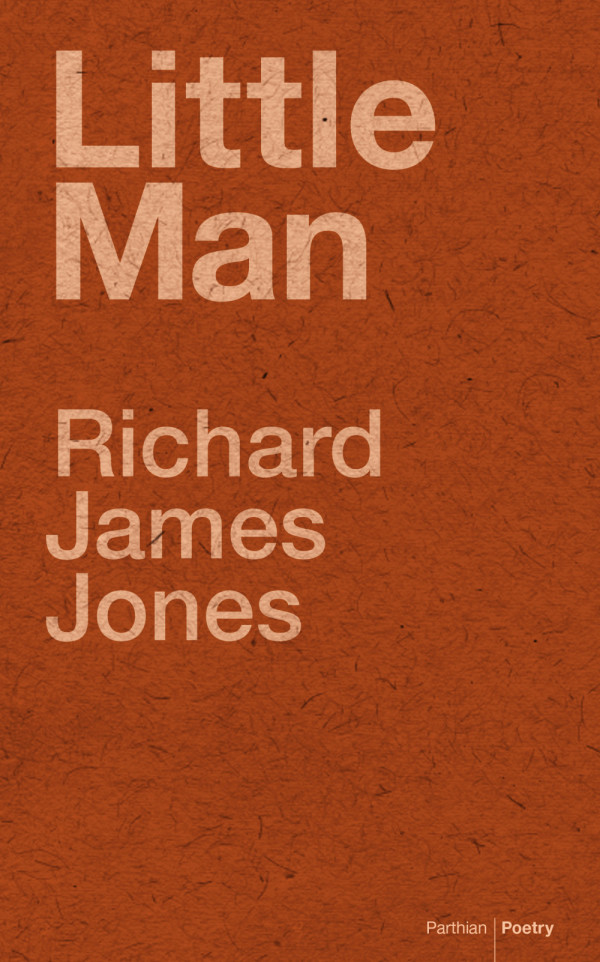Chris Cornwell casts a critical eye over Richard James Jones’ debut collection of poetry Little Man.
Richard James Jones’ debut collection is a reaffirming experience. I haven’t read a collection nearly as ambitious as this in many months. Jones’ Little Man exhibits soaring originality and is fizzing with ideas and innovation. Backed by a strong and unique aesthetic, it is controlled and, at points, gracefully restrained.

His vision sees mankind strung on an overstretched thong between a bestial heritage and an out-of-sight future, the harbinger of which is a tidal impulse of debris, plastic, artifice. “Dogfish, dead and stinking / threaded through torn nets”, mango crates, condoms, dog-shit,“Beer bottles. No Message.” Little Man trying to find a home in the re-emerging briar and brambles that now climb over the hulking corpus of surplus machines.
The tidal reprises of “Washed-up” interlace the collection, lending it shape and architecture. The four-fold installments of this list of marine litter, observed washing-up on the beach throughout one night, create a rhythm in the work. They also offer semantic inter-locution for the disparate concerns of individual poems, splicing the sensitive and textured offerings with Jones’ ever present wryness and preventing any possibility of pomposity.
Wreckage, flotsam, the fragments of found poetry are scattered through Little Man. This fragmentation gives a sea-sick sense of the sheer profusion of Man’s excesses, swelling around the shore. Threatening to blot out the possibilities of the future with a wave of returned goods and rubbish, our ancestors’ signature scrawled over it all, like a rain-run return address.
His writing has a delicious turn of phrase and little gems glimmer like islets among the choppy restlessness of the main body of the poems. Outstanding imagery and pace give the words luminosity:
The blueprint for the howl was writing itself
in our slaked throats. The canopy pulsed
as the moon beat a glass retreat, Stars shifted
into crown constellations.
The splintered focus of the poems demands the reader adopt a compound eye and refuses to be engaged with on a thoughtless level.
There are perhaps one or two poems which feel like asides and unessential to the overall collection; “Ten Pieces Of Advice I Should Have Listened To” feels a little lost here. That said it is entertaining enough not to be an irritating interruption and ultimately its inclusion does not detract from the other poems, in fact it serves to widen the already gaping scope of this book.
This slim volume of 34 pages contains 29 poems; all individuals; all discrete, and yet manages to cradle a sweeping significance in its modest life-span.
Little Man comprises largely free-verse poems, one or two prose-poems and a single gorgeous, imploring sonnetina, “Sing,” which foregrounds an elegance of style forced elsewhere in the collection to form the backdrop of Jones’ wit, guile and lexical intelligence:
Be quick. Abandon your hand tools.
Gather mother and feeding son. Run.
The altar’s cup is overflowing.
Offer up a dogwood fire.
Listen. The word is flashed with black.
Double bolt the chapel door. Sing.
Parthian must be commended for bringing this collection to the poetry reading public. Little Man is great value for anybody who wants to read and support smart writing which has both heart and guts in buckets. Barring the cover – which is printed in such a way as to give it a grainy appearance, implying reconstructed, recycled pulp in a lairy 70’s-sofa-orange, presumably intended to serve as a nod of the head to the Faber poetry editions – it is a well-presented collection and the book lives up to its contents.
A width of curiosity and a thoughtful, meticulously researched and well-kneaded approach dominate this collection but at times Jones is also an immensely intuitive poet, and at these times, his writing is liberated by fluency, like an unbroken breath. It catches up with itself and becomes a unity rather that a flick-book series of jolting, twitchy shadows, regarding one another with a self-critical eye.
Simultaneously clever, thoughtful, sensitive and sympathetic, with deft grasp of the interdependency of weight and mass, Jones proves here that a new poetry can emerge with a bulging breast from a period defined more by the cynical arching of an eyebrow than genuine attempts at progression.
Little Man is available from Parthian Books.
Chris Cornwell is a contributor to Wales Arts Review.











